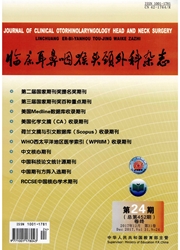

 中文摘要:
中文摘要:
耳聋是最常见的感官障碍疾病之一,每年1 000例新生儿中就有1例罹患此病。研究表明,至少50%的学语前耳聋和大多数迟发、进展性聋是由遗传因素所致。遗传性聋是符合孟德尔遗传规律的单基因疾病,按照遗传方式可分为:常染色体隐性、常染色体显性、X-连锁和线粒体遗传等。迄今为止,已有150余个与耳聋相关的基因座被定位,突变位点超过2000余种,存在明显的遗传异质性。
 英文摘要:
英文摘要:
Next-generation sequencing(NGS)technologies have improved as well as the costs have gradually decreased in the detections of genetic diseases.This article describes the principle,platform,and data analysis of NGS and the application of NGS technologies to the molecular diagnosis of hereditary hearing loss(HL).The use of NGS technologies makes the discovery of HL genes more feasible than ever.And the data obtained by NGS used in genetic counseling for clinical practice may assist in defining genetic profiles of HL individuals and expedite the pace of personalized medical care.
 同期刊论文项目
同期刊论文项目
 同项目期刊论文
同项目期刊论文
 Common molecular etiology of patients with nonsyndromic hearing loss in Tibetan, Tu nationality, and
Common molecular etiology of patients with nonsyndromic hearing loss in Tibetan, Tu nationality, and Associations between GJB2, Mitochondrial 12S rRNA, SLC26A4Mutations, and Hearing Loss among Three Et
Associations between GJB2, Mitochondrial 12S rRNA, SLC26A4Mutations, and Hearing Loss among Three Et Common molecular etilolgy of nonsydromic hearing loss in 484 patients of 3 ethnicties in northwest C
Common molecular etilolgy of nonsydromic hearing loss in 484 patients of 3 ethnicties in northwest C Analysis of common deafness gene mutations in deaf people from unique ethnic groups in Gansu Provinc
Analysis of common deafness gene mutations in deaf people from unique ethnic groups in Gansu Provinc Associations between GJB2, Mitochondrial 12S rRNA, SLC26A4 Mutations, and Hearing Loss among Three E
Associations between GJB2, Mitochondrial 12S rRNA, SLC26A4 Mutations, and Hearing Loss among Three E 期刊信息
期刊信息
